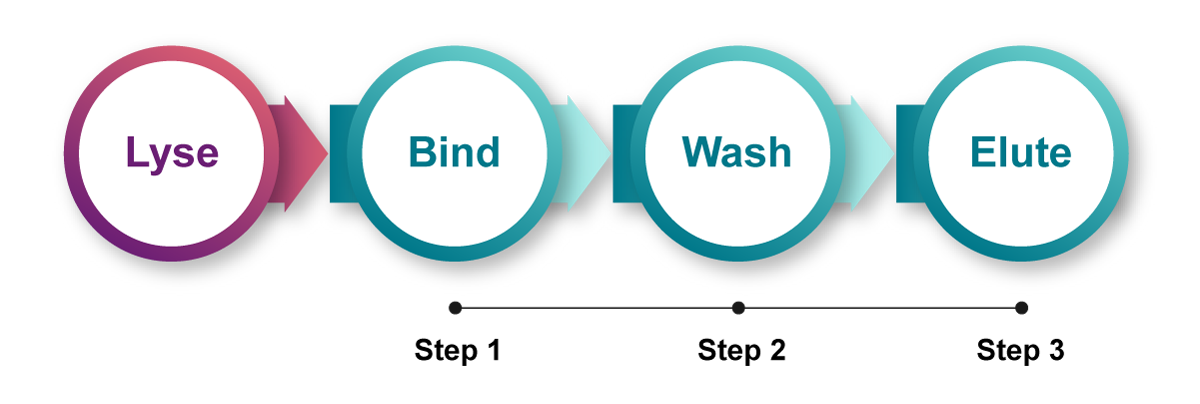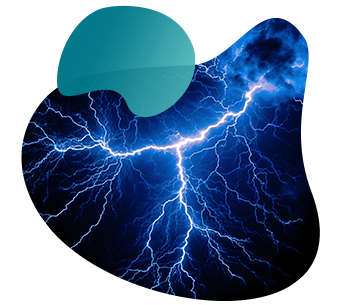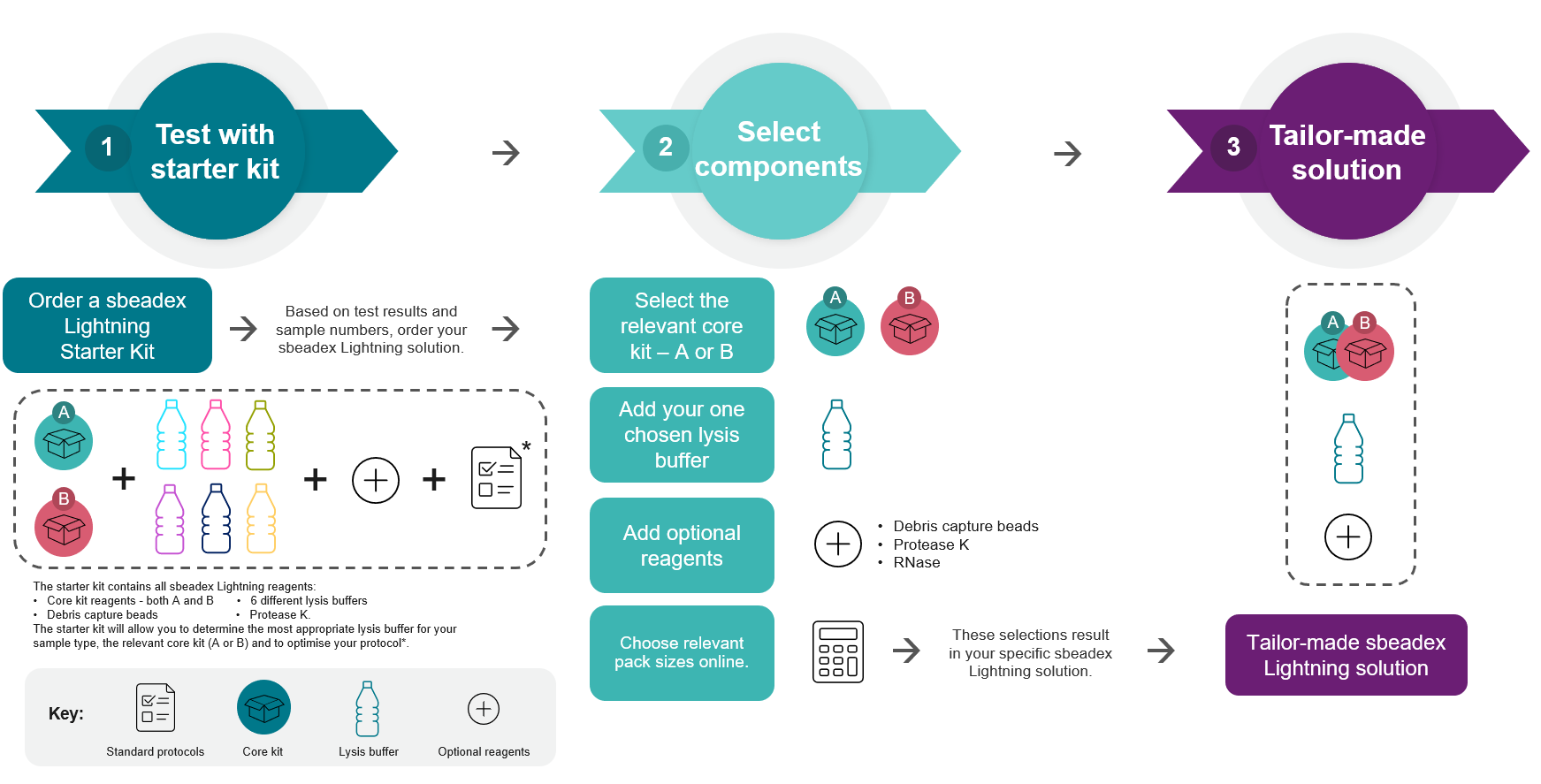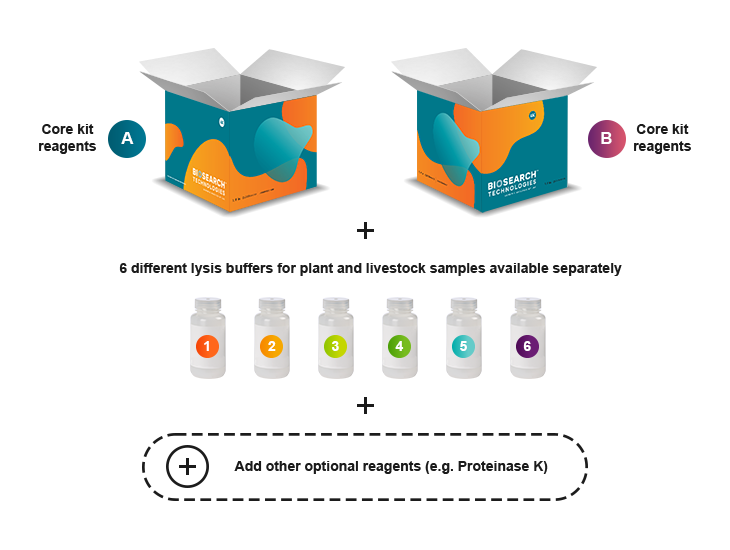
Save time and streamline your workflow with our new sbeadex Lightning Nucleic Acid Purification Kits
Our new sbeadex™ Lightning product line provides a revolutionary approach to nucleic acid isolation with a superfast and simple 3-step protocol, typically purifying nucleic acids in just 5 minutes from a variety of lysed plant and animal sample materials. This patent pending magnetic bead technology significantly reduces the extraction workflow saving up to 40 minutes per sample and increasing sample throughput by as much as 10 times versus competitors. Reductions in liquid waste (by an average of 60%) and plastic waste (by an average of 50%) are achievable compared to magnetic bead-based and spin column-based competitor kits whilst boasting the simplest and fastest nucleic acid purification workflow in the market.

sbeadex Lightning at a glance
sbeadex Lightning has brought game-changing innovative solutions to traditional nucleic acid purification. Our cutting-edge technology delivers high-quality DNA in high yield, all within a simple, ultrafast 3-step/5-minute protocol designed to save time and costs. With fewer protocol steps, the error probability is lower, ensuring reliable and consistent results for every purification.

Transforming the traditional, time-consuming steps of nucleic acid purification – sbeadex Lightning revolutionises your workflow, reducing it to just 3 steps and 5 minutes
How sbeadex Lightning works
Live demo of DNA purification in under 5 minutes
Powered by superparamagnetic particles and a novel one-step binding mechanism, sbeadex Lightning efficiently binds and purifies nucleic acids. Combined with a single water washing step, this unique process effectively removes impurities and potential inhibitors of enzymatic reactions, preparing nucleic acids for a wide range of downstream applications, including PCR, RT-PCR, sequencing/NGS and restriction analysis.
- Superfast, simplified, and convenient, our 3-step/5-minute protocol saves time and money, and is easily adaptable to high-throughput automation
- Highly purified DNA suitable for many downstream applications
- No potential PCR inhibitors (e.g. organic solvents/ethanol, salts) in final wash step and eluate
- Environmentally friendly kits and reagents: reduces plastics, packaging, shipping costs and hazardous waste
- Ready-to-use reagents with high stability at room temperature
- Compatible with most popular robotic platforms (e.g. KingFisher, Hamilton, Tecan, Beckman-Coulter or our high-throughput oKtopure™ instrument)
sbeadex™ Lightning nucleic acid purification chemistry
Our new sbeadex Lightning technology offers all the advantages of the original sbeadex – but revolutionises the rather time-consuming, multi-step workflow of current nucleic acid purification methods. sbeadex Lightning uses superparamagnetic particles and a novel one-step binding mechanism to bind and purify nucleic acids. Combined with a single water washing step, this unique process removes impurities and potential inhibitors of enzymatic reactions very effectively, preparing nucleic acids for use in downstream applications including PCR and RT-PCR, sequencing, NGS and restriction analysis.
The very simple purification workflow involves only 3 steps and typically requires just 5 minutes from lysate to DNA while delivering high yields of pure DNA.
It therefore dramatically increases potential sample throughput per day – either through manual or automated nucleic acid purification – saving time and laboratory costs. Fewer protocol steps also mean fewer buffers, fewer plastic consumables and reduced liquid waste which helps to protect the environment (table 1).
We recommend starting with our comprehensive starter kit to evaluate performance and optimise workflow before progressing to one of our core kits. The sbeadex Lightning Starter Kit is designed as an essential first step, offering the opportunity to test and determine the optimal core kit and lysis conditions. We offer two versions of the sbeadex Lightning core kits (Kit A or Kit B), each optimised under different conditions and for specific sample types. These kits include a sbeadex Lightning binding buffer, sbeadex particle suspension, and elution buffer (AMP).
The reagents of the sbeadex Lightning chemistry are not only reduced in volume but are also less hazardous than common reagents used in classical magnetic bead, spin column or solution-based workflows. Thus, our new sbeadex Lightning is not only faster, simpler and more convenient – but also more environmentally friendly. Compared to the classical magnetic bead or spin-column based technologies, sbeadex Lightning shows comparable results with regard to DNA purity, quality and yields – but is significantly faster, simpler and cost-saving (see tables 1-4).

Figure 1. How to get started with sbeadex Lightning technology.
1. Order a sbeadex Lightning Starter Kit and test this with your samples. Once you have optimised your protocol, (2.) select/order the components to generate your tailor-made sbeadex Lightning solution (3.). * Please find standard protocols and sample-specific lysis buffer recommendations online or contact techsupport@lgcgroup.com for assistance.
The sbeadex Lightning chemistry comes as a modular system to enable you to compile an optimal kit tailored to your specific needs – see figure 1 below. The technology involves a core kit, either Kit A or Kit B, consisting of binding buffer, sbeadex particle suspension and elution buffer. In addition, there is a range of individual components (e.g. lysis buffers, Proteinase K solution, debris capture beads) that can be purchased separately. To help with optimisation of the lysis conditions, we also provide a sbeadex Lightning Starter Kit that includes both core kits, six different lysis buffers (PN, PVP, UR, BL, H, LI), Protease K solution and debris capture beads.
There are two different sbeadex Lightning core kits:
- Core Kit A is suitable for most sample types and is recommended for most plant samples (see tables 1 and 2 in technology and application data section).
- Core Kit B is suitable for specific sample types, especially mammalian tissue samples.
This game-changing innovation requires only a binding buffer, our proprietary sbeadex particles and an elution buffer to purify DNA quickly from a lysed sample. The (optional) wash step is performed with water, preventing organic/alcoholic traces in the eluate that might inhibit enzymatic downstream applications. This reduction in required buffers also saves plastic bottles and packaging material as well as storage space and shipping costs which additionally contributes to the environmental sustainability of our products.

Our original sbeadex chemistry utilises a novel two-step binding mechanism to bind and purify nucleic acids, in a 5-step protocol (post-lysis) that requires approximately 45 minutes processing time. The sbeadex beads allow efficient and high-quality purification of both small and large nucleic acid fragments without centrifugation steps. The beads are double-coated, resulting in a unique dual binding protocol that allows elution of ultrapure nucleic acids into water, significantly reducing solvent carryover that might affect downstream applications.

sbeadex Lightning nucleic acid purification protocol. By utilising a revolutionary novel one-step binding mechanism, sbeadex Lightning reduces the traditional magnetic bead-based nucleic acid purification workflow to a 3-step protocol (post-lysis) that typically requires just 5 minutes processing time.
Applications
- DNA purification for many downstream applications such as PCR/qPCR, RT-PCR or NGS
- Applicable to a wide range of sample types including plant and animal tissues (tables 1 and 2)
| Plant tissue | ||
|---|---|---|
| leaf | ||
| cucumber leaves | barley leaves | carrot leaves |
| brassica leaves | corn leaves | melon leaves |
| tomato leaves | potato leaves | cannabis leaves |
| pepper leaves | pea leaves | oat leaves |
| wheat leaves | parsley | |
| seed | ||
| corn seed | canola seed | soy seed |
| sunflower seed | ||
| fruit | ||
| blackberry | blueberry | potato |
Table 1: Plant sample types successfully tested using the sbeadex Lightning chemistry for DNA purification.
| Animal tissue | |
|---|---|
| bovine ear punch | mouse ears |
| bovine meat | mouse tail |
| bovine hairs | Chicken (wing) |
| pig ear punches | Salmon (fin) |
| Trout (muscle biopsy) | Beef (muscle tissue biopsy) |
| Biological fluids | |
| chicken blood (in storage buffer) | |
Table 2: Animal sample types successfully tested using the sbeadex Lightning chemistry for DNA purification.
sbeadex Lightning has been successfully tested against popular plant DNA purification kits from market-leading competitors, showing comparable or even better DNA purities and yields (table 3) as well as a clear reduction of protocol steps and time – in addition to significant savings regarding consumption of plastic consumables and amount of liquid waste (table 4). Moreover, DNA isolated using sbeadex Lightning also showed a very good integrity compared to DNA isolated using those competitor kits (figure 4).
Please find a complete list of already tested plant and animal samples with a recommendation of the appropriate Core Kit and Lysis buffers/conditions here.
| Purification chemistry |
Yield via fluorescence [µg DNA/ mg sample] |
Yield via UV-Vis [µg DNA /mg sample] |
A260/280 | A260/230 |
|---|---|---|---|---|
| sbeadex Lightning (upscaled) | 0.5 | 0.9 | 1.8 | 1.5 |
| sbeadex maxi plant (upscaled) | 0.3 | 0.6 | 1.9 | 1.4 |
| Competitor A | 0.03 | 0.3 | 1.9 | 0.1 |
| Competitor B | 0.2 | 1.1 | 1.8 | 2.0 |
| Competitor C | 0.02 | 0.1 | 1.6 | 0.4 |
| Competitor D | 0.3 | 0.5 | 1.9 | 1.8 |
| Competitor E | 0.4 | 0.6 | 1.7 | 0.7 |
| Competitor F | 0.1 | 0.1 | 1.8 | 2.3 |
Table 3: A summary of DNA quantity and purity values for sbeadex Lightning, original sbeadex, and market-leading competitors. Values are based on processing of 15 mg maize leaf tissue samples. Both the sbeadex Lightning protocol and the sbeadex maxi plant protocol were upscaled to 400 µL lysate input to account for the different lysate input amounts used by competitors.
| Purification chemistry | Protocol steps* | Mean protocol time per sample** | Mean plastic waste per sample | Liquid waste per sample |
|---|---|---|---|---|
| sbeadex Lightning (upscaled) | 3 | 5 min | 2 g | 1.8 mL |
| Competitor A | 5 | 20 min | 6 g | 1.8 mL |
| Competitor B | 6 | 45 min | 9 g | 3.4 mL |
| Competitor C | 7 | 24 min | 7 g | 2.6 mL |
| Competitor D | 5 | 26 min | 8 g | 3.4 mL |
| Competitor E | 8 | 34 min | 9 g | 3.4 mL |
| Competitor F | 8 | 29 min | 19 g | 2.1 mL |
Table 4: A summary of the key savings for sbeadex Lightning compared to original sbeadex protocols and market-leading competitors. This table summarises the savings in protocol time, protocol steps, plastic consumables, and liquid waste. Values are based on processing of 15 mg maize leaf tissue samples. The sbeadex Lightning protocol was upscaled to 400 µL lysate input to account for the different lysate input amounts used by competitors. *excluding lysis step ** manual protocol
Figure 4: Gel electrophoresis image of DNA purified from maize leaf with sbeadex Lightning and competitor kits (compare figure 2 and table 2). The 0.8 % agarose gel was run at 80 V for 45 minutes and subsequently stained with ethidium bromide. Per sample, 6 µL purified DNA was added to each lane. 1: sbeadex Lightning (upscaled), 2: Competitor D, λ: 100 ng lambda DNA, 3: Competitor C, 4: Competitor B, 5: Competitor E, 6: Competitor F, 7: Competitor A.
Chemistry format
The sbeadex Lightning chemistry comes as a modular system to enable you to compile an optimal kit tailored to your specific needs. We provide two versions of sbeadex Lightning core kits (Kit A or Kit B) that contains a sbeadex Lightning binding buffer (LP in Kit A and LU in Kit B), sbeadex particles suspension and elution buffer AMP. These core kits can be complemented with a range of individual components (e.g. lysis buffers, Protease K solution, debris capture beads) that can be purchased separately.
To help with optimisation of the lysis conditions, we also provide a sbeadex Lightning Starter Kit that includes the binding buffers of both core kits, six different lysis buffers (PN, PVP, UR, BL, H, LI), Protease K solution and debris capture beads. Our Quick guide for the sbeadex Lightning Starter Kit will help you to test and determine your optimal lysis and purification conditions.
How to get started with sbeadex Lightning technology

Order a sbeadex Lightning Starter Kit and test this with your samples. Once you have optimised your protocol, (2.) select/order the components to generate your tailor-made sbeadex Lightning solution (3.). *Please find sample-specific standard protocols online or contact techsupport@lgcgroup.com for assistance.
Note: Our first sbeadex Lightning protocols have been developed for purification of DNA from plant and animal samples but we are already developing protocols for other sample types. We have observed that sbeadex Lightning is also suitable for RNA isolation and are currently also validating this application.
If you are working with samples other than plant or animal, the sbeadex Lightning Nucleic Acid Purification Starter Kit can still be used to evaluate whether sbeadex Lightning is appropriate for your specific sample types.

Figure 1. How to get started with sbeadex Lightning technology.
1. Order a sbeadex Lightning Starter Kit and test this with your samples. Once you have optimised your protocol, (2.) select/order the components to generate your tailor-made sbeadex Lightning solution (3.). * Please find standard protocols and sample-specific lysis buffer recommendations online or contact techsupport@lgcgroup.com for assistance.

